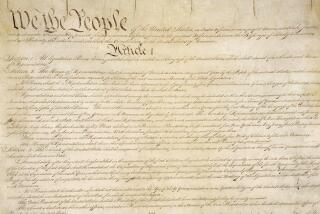Constitution read on House floor, but it wasn’t so simple
- Share via
Reporting from Washington — When Republicans announced they would kick off their reign in the House will a full reading of the U.S. Constitution, many dismissed the gesture as merely symbolic. Few, however, expected it to be so complicated.
As lawmakers prepared for the first-ever reading of the Constitution on the House floor, a brief debate erupted Thursday over exactly which portions of it should be read.
Were members to read the full text, including the sections nullified by later amendments? Would a lawmaker read the phrase “three-fifths of all other persons,” a description made void by the abolition of slavery?
Nothing is simple, it seems, in the discussion of the Constitution. Although many viewed Thursday’s exercise as a nod to the conservative “tea party” movement, which pushes for a narrow reading of the Constitution, it was a Democrat who advocated the fullest reading of the document.
The Republican majority opted for what might be considered the edited version, leaving out phrases superseded by amendments.
Rep. Robert W. Goodlatte, the Virginia Republican put in charge of the reading, said that the text was chosen in consultation with the Congressional Research Service and the Library of Congress.
But Rep. Jesse L. Jackson Jr., a Democrat from Illinois, argued that the whole document should be read, acknowledging that, however revered the document and its authors, it had been improved over time.
The outdated sections “justify why some of us fight for programs in this Congress,” Jackson said. Learning that the “three-fifths” clause would be left out, “it was of consequence to us,” said the lawmaker, son of civil rights leader Rev. Jesse Jackson.
Before the reading began, Democrats took to the floor to point out the phrase that they believe allows the healthcare law passed last year.
“Listen hard today to those words, ‘promote the general welfare,’ ” said Rep. Jim Himes, a Connecticut Democrat.
Texas Republican Rep. Ted Poe rose to take the opposite view. “Congress must repeal this totalitarian act,” he said, branding the law “unconstitutional oppression.”
Eventually, the reading proceeded — until it didn’t. When lawmakers got to Article II, Section 1 — the qualifications for the president of the United States — another objection was registered.
At the phrase “natural born citizen,” a woman cried out from the gallery: “Except Obama!”
She was escorted from the chamber.
kathleen.hennessey@latimes.com
More to Read
Sign up for Essential California
The most important California stories and recommendations in your inbox every morning.
You may occasionally receive promotional content from the Los Angeles Times.














